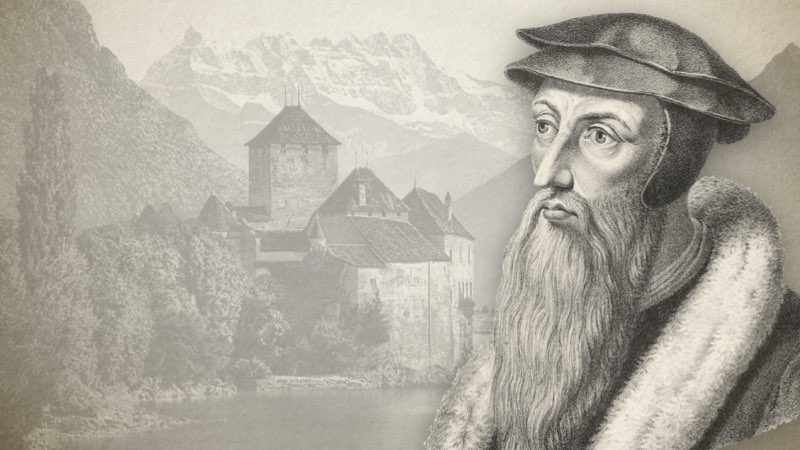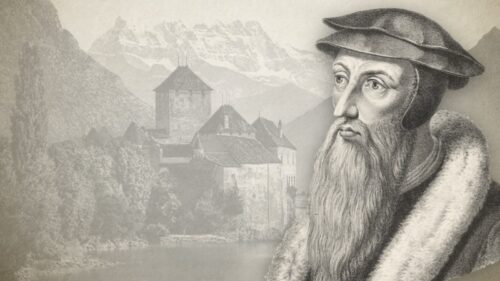John Calvin
John Calvin (1509-1564) was a French pastor, theologian, writer and leading reformer during the Protestant Reformation. His most popular works are his “Institutes Of The Christian Religion” and his commentaries on most books of the Bible. He set forth the absolute sovereignty of God in history and salvation, ascribing all glory to the One with Whom we have to do—the TriUne Jehovah. It is from the teachings of Calvin that the Presbyterian churches emerged. The label which bears his name (“Calvinism”) refers not to all of the teachings he espoused, but rather, to those teachings dealing with the salvation of sinners, otherwise known as the Five Points of Calvinism, or, the Doctrines of Grace.
John Calvin's Institutes Of The Christian Religion, Book 1 (Complete)
John Calvin's Institutes Of The Christian Religion, Book 2 (Complete)
John Calvin's Institutes Of The Christian Religion, Book 3
-
Book 2: Chapter 7, The Law Given, Not To Retain A People For Itself, But To Keep Alive The Hope Of Salvation In Christ Until His Advent
The divisions of this chapter are, I. The Moral and Ceremonial Law a schoolmaster to bring us to Christ, sec. 1, 2. II. This true of the Moral Law, especially its conditional promises. These given for the best reasons. In what respect the observance of the Moral Law is said to be impossible, sec. 3–5. III. Of the threefold office and use of the Moral Law, sec. 6–12. Antinomians refuted, sec. 13. IV. What the abrogation of the Law, Moral and Ceremonial, sec. 14–17. Sections. 1. The whole system of religion delivered by the hand of Moses, in many ways pointed to Christ. This exemplified in the case of sacrifices, ablutions, and an endless series of ceremonies. This proved, 1. By the declared purpose of…
-
Book 2: Chapter 6, Redemption For Man Lost To Be Sought In Christ
The parts of this chapter are, I. The excellence of the doctrine of Christ the Redeemer—a doctrine always entertained by the Church, sec. 1. II. Christ, the Mediator in both dispensations, was offered to the faith of the pious Israelites and people of old, as is plain from the institution of sacrifice, the calling of Abraham’s family, and the elevation of David and his posterity, sec. 2. III. Hence the consolation, strength, hope, and confidence of the godly under the Law, Christ being offered to them in various ways by their heavenly Father. Sections. 1. The knowledge of God the Creator of no avail without faith in Christ the Redeemer. First reason. Second reason strengthened by the testimony of an Apostle. Conclusion. This doctrine entertained…
-
Book 2: Chapter 5, The Arguments Usually Alleged In Support Of Free Will Refuted
Objections reduced to three principal heads:—I. Four absurdities advanced by the opponents of the orthodox doctrine concerning the slavery of the will, stated and refuted, sec. 1–5. II. The passages of Scripture which they pervert in favour of their error, reduced to five heads, and explained, sec. 6–15. III. Five other passages quoted in defence of free will expounded, sec. 16–19. Sections. 1. Absurd fictions of opponents first refuted, and then certain passages of Scripture explained. Answer by a negative. Confirmation of the answer. 2. Another absurdity of Aristotle and Pelagius. Answer by a distinction. Answer fortified by passages from Augustine, and supported by the authority of an Apostle. 3. Third absurdity borrowed from the words of Chrysostom. Answer by a negative. 4. Fourth absurdity…
-
Book 2: Chapter 4, How God Works In The Hearts Of Men
The leading points discussed in this chapter are, I. Whether in bad actions anything is to be attributed to God; if anything, how much. Also, what is to be attributed to the devil and to man, sec. 1–5. II. In indifferent matters, how much is to be attributed to God, and how much is left to man, sec. 6. III. Two objections refuted, sec. 7, 8. Sections. 1. Connection of this chapter with the preceding. Augustine’s similitude of a good and bad rider. Question answered in respect to the devil. 2. Question answered in respect to God and man. Example from the history of Job. The works of God distinguished from the works of Satan and wicked men. 1. By the design or end of…
-
Book 2: Chapter 3, Everything Proceeding From The Corrupt Nature Of Man Damnable
The principal matters in this chapter are—I. A recapitulation of the former chapter, proving, from passages of Scriptures that the intellect and will of man are so corrupted, that no integrity, no knowledge or fear of God, can now be found in him, sect. 1 and 2. II. Objections to this doctrine, from the virtues which shone in some of the heathen, refuted, sect. 3 and 4. III. What kind of will remains in man, the slave of sin, sect. 5. The remedy and cure, sect. 6. IV. The opinion of Neo-Pelagian sophists concerning the preparation and efficacy of the will, and also concerning perseverance and co-operating grace, refuted, both by reason and Scripture, sect. 7–12. V. Some passages from Augustine confirming the truth of…
-
Book 2: Chapter 2, Man Now Deprived Of Freedom Of Will, And Miserably Enslaved
Having in the first chapter treated of the fall of man, and the corruption of the human race, it becomes necessary to inquire, Whether the sons of Adam are deprived of all liberty; and if any particle of liberty remains, how far its power extends? The four next chapters are devoted to this question. This second chapter may be reduced to three general heads: I. The foundation of the whole discussion. II. The opinions of others on the subject of human freedom, see. 2–9. III. The true doctrine on the subject, see. 10–27. Sections. 1. Connection of the previous with the four following chapters. In order to lay a proper foundation for the discussion of free will, two obstacles in the way to be removed—viz.…


